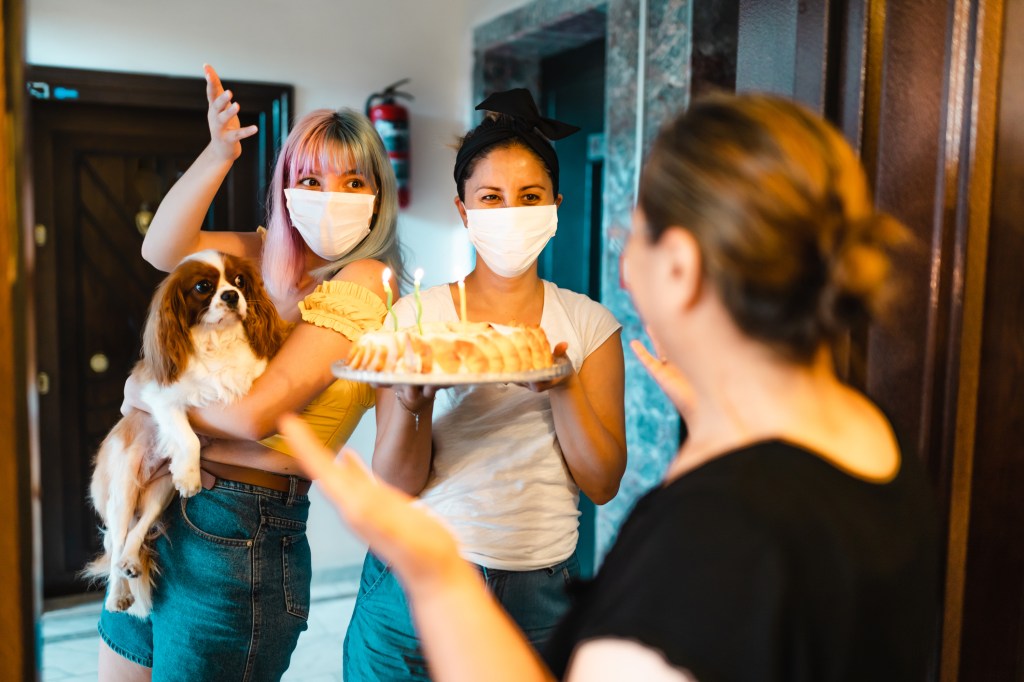Earlier this week, the CDC released its first set of guidelines for the small (but steadily growing) population of people who’ve been fully vaccinated against COVID-19. As Shira Shafir, an associate professor of epidemiology at the UCLA Fielding School of Public Health, told VICE, this is, apparently, a pretty big move and a very good sign.
“The CDC is a very risk-averse organization,” Shafir said. “It’s a very big deal that they’ve released this guidance, and, as we vaccinate more people, we’ll get updated guidance.”
Videos by VICE
The guidelines released thus far err firmly on the side of caution, and don’t necessarily change much for the fully vaxxed, if only because less than 10 percent of the US population has received the jab. But, as Shafir said, the guidelines are a sign that things are changing, and will continue to change even more, as the vaccine rollout continues.
After a year and counting of life getting upended, a return to semi-normalcy now feels, frankly, a little confusing. To help sort out what exactly the CDC guidelines mean, and how they apply to yo (do you have to keep wearing a mask? can you see your grandparents?), Shafir broke down the safety levels of several scenarios you may come up against in the near future.
You’re vaccinated but none of your other friends are. Can you ditch your mask around them?
Answer: No.
“You should absolutely continue wearing a mask,” Shafir said, adding that the research on whether vaccinated folks can transmit the virus is still ongoing and murky.
“We have some suspicions that people who are vaccinated may not be able to transmit, which would be incredibly exciting news,” she said. “But we don’t know that for sure yet. Until then, we have to act as if someone who is vaccinated could still transmit the virus.”
You’re vaccinated, your friend isn’t. Can you have them over to your house?
Answer: Yes (with exceptions).
Because the ability for vaccinated people to transmit is unclear, as Shafir said, this depends on the unvaccinated person’s risk level for severe illness. If your friend is not at high risk of a severe COVID infection according to the CDC, and none of their housemates are either, then yes, they can come over and hang out with you, maskless.
Your grandparents are vaccinated but you aren’t. Can you hug them?
Answer: Yes (with exceptions).
“The biggest thing to remember is that people who are fully vaccinated are protected from severe disease,” Shafir said. “So if your grandparents have been fully vaccinated, they might be a risk to you but you are no longer a risk to them.”
If your grandparents are among the population of seniors who are booking vacations at all-inclusive resorts and generally going hog wild, post-vax, then they may actually be a danger to you, which is an extreme role reversal from the past year. However, if your grandparents are still mostly chilling at home, and/or you’re not a high-risk for severe infection, you can probably go hang out with and hug them.
“The CDC was really trying to think of ways to allow grandparents to see younger grandchildren, but we can extend that, as well, to grandkids who are in their twenties,” Shafir said.
You’re vaccinated but your parents aren’t. Can you hug them?
Answer: Yes (with exceptions).
Because of, again, the uncertainty around transmission, post-vax, this is only OK if your parents don’t meet any of the criteria for severe infection, and if you don’t have to travel by any form of public transportation to get to them. If your parents live in another state, it’s probably not yet cool for you to hop a plane to see them. Likewise, if they have any comorbidities or are over the age of 65, you’re better off waiting until they’ve been vaccinated, too.
“I would continue to exercise caution and just continue to gather outside, with masks on,” Shafir said.
You want to throw a dinner party (indoors) with your friends, 60 percent of whom are vaccinated. Can you?
Answer: No.
“For right now, that’s something we should hold off on,” Shafir said. “We should not have gatherings where we’re mixing more than one household of vaccinated and unvaccinated people.”
The guidelines are specific that it’s fine for vaccinated people to visit unvaccinated people, but multiple unvaccinated groups still should not mix. While the CDC says it’s alright for vaccinated people to hang out inside without masks on, that also doesn’t apply to mixed groups of vaccinated and unvaccinated folks.
You’re fully vaccinated and live in a state like Texas, where the COVID restrictions were just completely lifted. Can you chill in public without a mask?
Answer: No.
Huge no!
“Right now, the CDC says that no matter where you are, and no matter whether you’re vaccinated or not, we should all continue to wear masks in public, until more vaccinations are completed,” Shafir said, adding a hearty “good luck” to those in states without mask rules.
While Shafir described the existence of several safe, effective COVID-19 vaccines as “nothing short of a scientific miracle,” she added that they are but one more tool in the prevention toolkit. Combined with continued social distancing and masking, vaccines are incredibly effective against the spread of COVID-19. (This is all explained by the Swiss Cheese Model of pandemic defense.)
“We have to remember that we have other tools that still need to be used to maximize the chance that we can prevent people from getting sick, and ultimately prevent people from dying,” Shafir said.
Until more people are vaccinated—and they will be, as Biden promises—the CDC guidelines are clear. And there will be updated guidelines as vaccination increases.
“The CDC is a public health agency,” Shafir said. “It’s going to consider what is most effective in terms of helping the whole population. What that means is each individual might not get exactly what they want when they want it. Yes, the CDC is risk averse, but the foundation of that risk averseness is making decisions that protect the health of the entire population.”
Follow Hannah Smothers on Twitter.







